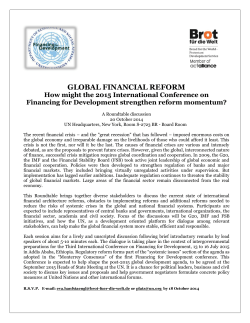
Revital Kaminker
Revital Kaminker – Elings Fellow in Experimental Science Biography – Revital was born in Israel and carried out her undergraduate studies in chemistry at Tel Aviv University (B.Sc., cum laude, 2006). She received her M.Sc. (2009) and Ph.D. (2014) from the Weizmann Institute of Science, where she worked with Professor Milko E. van der Boom on molecule-based assemblies on solid surfaces and in soft matter. She collaborated with the Nitschke group from the University of Cambridge on the formation of surfaceconfined helicates. Revital will join CNSI as an Elings Fellow in July 2014. Previous Research Highlights Fundamental Understanding of the Formation and Properties of Metal-Organic Supramolecular Materials. • Properties and growth mechanism studies of metal-organic networks (MON) on a solid support by a stepwise deposition approach. • Understanding of the critical role of molecular geometries, their number of binding sites and flexibility in assemblies of metal nanoparticles and nanostructures of coordination polymers. Highlighted in ChemPhysChem, 2010, 11, 2075, and in Angew. Chem. Int. Ed., 2011, 27, 6001. Surface-Confined Double-Helical Oligomers • Extended homochiral helicates on solid surfaces which allowed chiral discrimination towards small molecules and showed to have properties of rectifiers. Zachary M. Hudson – Elings Fellow in Experimental Science Biography –Zac was born in Ottawa, Canada, and completed his B.Sc. and Ph.D. at Queen’s University in Kingston, Ontario under the supervision of Prof. Suning Wang. His doctoral work focused on the development of luminescent platinum- and boron-containing materials and their use in organic electronics. In 2012, joined the group of Prof. Ian Manners at the University of Bristol as a Marie Curie postdoctoral fellow, where he examined the self-assembly of functional block copolymer nanostructures. Zac will join CNSI as an Elings Fellow in September 2014. Awards and Honors 2012 - Canadian Council of University Chemistry Chairs (CCUCC) Doctoral Award for the top Ph.D. in chemistry in Canada 2012 – EU Marie Curie International Incoming Fellowship 2012 – Governor General’s Gold Medal for the top Ph.D. at Queen’s University 2009 – NSERC Alexander Graham Bell Canada Graduate Scholarship Previous Research Highlights – Colour-Tunable Self-Assembled Nanopixels • Methods for synthesizing functional metallopolymers capable of living crystallization-driven self-assembly were developed • Self-assembled multiblock nanostructures for visible light generation – New Materials for Highly Efficient OLED Displays • New phosphorescent dopants and charge-transport materials were developed for use in OLED devices, giving world-record performance even at high brightness • New host materials were prepared that function simultaneously as electron- and hole-transporting layers in an OLED, allowing for the fabrication of highly efficient devices at significantly reduced cost 5 μm John G. Labram – Elings Fellow in Experimental Science Biography – John was born in Bath, United Kingdom, and received his undergraduate degree in Physics from The University of Warwick in 2008. He received his PhD from Imperial College London in Experimental Solid State Physics in 2011. During his PhD John studied ambipolar organic field-effect transistors under the supervision of Prof. Thomas Anthopoulos. Between 2011 and 2013 John took a break from academia and worked for The Royal Bank of Scotland as a currency-options trader. Here he specialized in understanding and predicting trends in the volatility of emergingmarket currencies. John will join CNSI as an Elings Fellow in November 2014. Awards and Honors 2012 – Solid State Physics Thesis Prize, Imperial College London. 2010 –Prize, Society for Information Display Previous Research Highlights –Ambipolar Organic Phototransistors • By employing self-assembled monolayer dielectrics, light-sensitive organic field-effect transistors were demonstrated with operating voltages below 2V. • By integrating multiple ambipolar organic phototransistors, low-voltage, light-sensitive logic circuits, such as voltage inverters, were also realized. – Study of Polymer:Fullerene Morphology Using Field-Effect Transistors • Studied and simulated the impact of polymer:fullerene phasesegregation on the lateral charge transport properties of electrons and holes in binary blends. • Investigated the diffusion properties of fullerenes in polymers by exploiting bilayer organic field-effect transistors.
© Copyright 2025



















